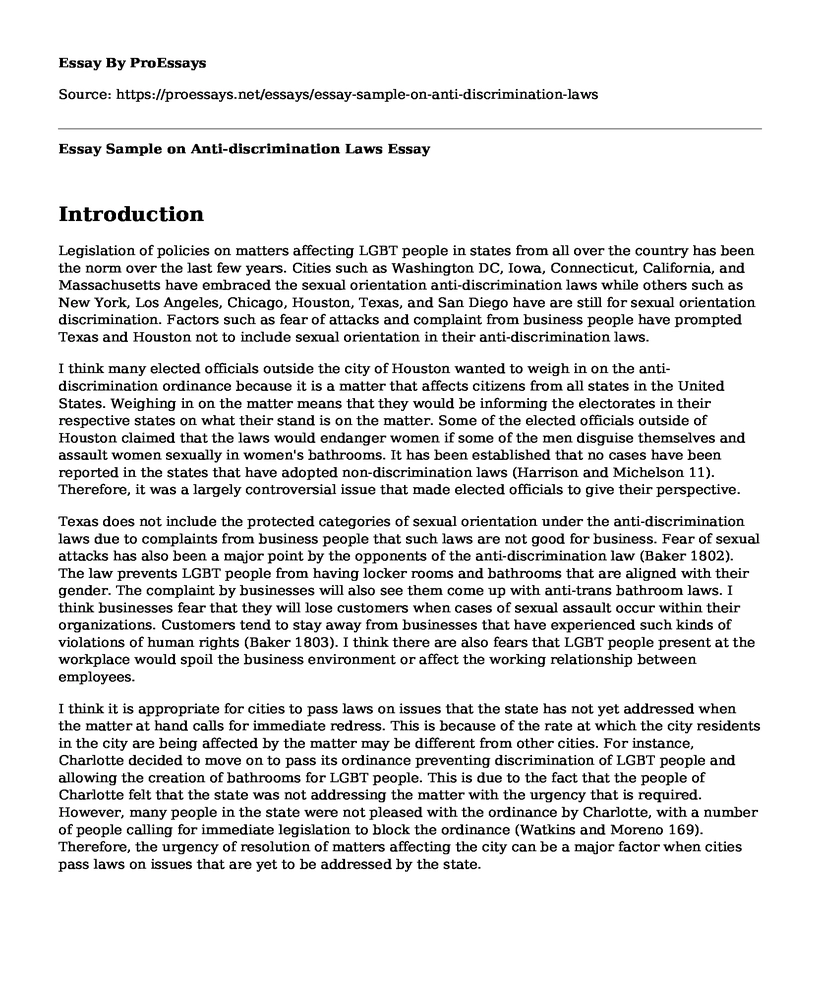Introduction
Legislation of policies on matters affecting LGBT people in states from all over the country has been the norm over the last few years. Cities such as Washington DC, Iowa, Connecticut, California, and Massachusetts have embraced the sexual orientation anti-discrimination laws while others such as New York, Los Angeles, Chicago, Houston, Texas, and San Diego have are still for sexual orientation discrimination. Factors such as fear of attacks and complaint from business people have prompted Texas and Houston not to include sexual orientation in their anti-discrimination laws.
I think many elected officials outside the city of Houston wanted to weigh in on the anti-discrimination ordinance because it is a matter that affects citizens from all states in the United States. Weighing in on the matter means that they would be informing the electorates in their respective states on what their stand is on the matter. Some of the elected officials outside of Houston claimed that the laws would endanger women if some of the men disguise themselves and assault women sexually in women's bathrooms. It has been established that no cases have been reported in the states that have adopted non-discrimination laws (Harrison and Michelson 11). Therefore, it was a largely controversial issue that made elected officials to give their perspective.
Texas does not include the protected categories of sexual orientation under the anti-discrimination laws due to complaints from business people that such laws are not good for business. Fear of sexual attacks has also been a major point by the opponents of the anti-discrimination law (Baker 1802). The law prevents LGBT people from having locker rooms and bathrooms that are aligned with their gender. The complaint by businesses will also see them come up with anti-trans bathroom laws. I think businesses fear that they will lose customers when cases of sexual assault occur within their organizations. Customers tend to stay away from businesses that have experienced such kinds of violations of human rights (Baker 1803). I think there are also fears that LGBT people present at the workplace would spoil the business environment or affect the working relationship between employees.
I think it is appropriate for cities to pass laws on issues that the state has not yet addressed when the matter at hand calls for immediate redress. This is because of the rate at which the city residents in the city are being affected by the matter may be different from other cities. For instance, Charlotte decided to move on to pass its ordinance preventing discrimination of LGBT people and allowing the creation of bathrooms for LGBT people. This is due to the fact that the people of Charlotte felt that the state was not addressing the matter with the urgency that is required. However, many people in the state were not pleased with the ordinance by Charlotte, with a number of people calling for immediate legislation to block the ordinance (Watkins and Moreno 169). Therefore, the urgency of resolution of matters affecting the city can be a major factor when cities pass laws on issues that are yet to be addressed by the state.
Conclusion
Overall, sexual orientation was not included under anti-discrimination laws for the simple reason that businesses felt threatened by the law and there were fears of sexual attacks against women. Sexual attacks have not been reported before in any of the states that have allowed enacted sexual orientation discrimination laws. Therefore, a number of elected officials have argued that fears of sexual attacks are baseless and misguided.
Works Cited
Baker, Kellan E. "The future of transgender coverage." New England Journal of Medicine 376.19 (2017): 1801-1804.Harrison, Brian F., and Melissa R. Michelson. "Gender, masculinity threat, and support for transgender rights: An experimental study." Sex Roles (2018): 1-13.
Watkins, Paul J., and Edward Moreno. "Bathrooms without Borders: Transgender Students Argue Separate is not Equal." The Clearing House: A Journal of Educational Strategies, Issues, and Ideas 90.5-6 (2017): 166-171.
Cite this page
Essay Sample on Anti-discrimination Laws. (2022, May 16). Retrieved from https://proessays.net/essays/essay-sample-on-anti-discrimination-laws
If you are the original author of this essay and no longer wish to have it published on the ProEssays website, please click below to request its removal:
- Violence Against Women and Girls - Sociology Essay Example
- How Does Cyberbullying Affect the Youth Mental Health? - Annotated Bibliography
- Paper Example on State Sponsored Terrorism
- Essay Sample on Preventive Measures of Drug Addiction Among Youths
- Essay Sample on Animal Testing for Cosmetics: Cruelty or Necessity?
- Free Report Example on Improving Living Standards Through Adequate Housing
- Fostering Private-Public Partnerships: The People Concern's Mission to Address Social Challenges - Free Paper







